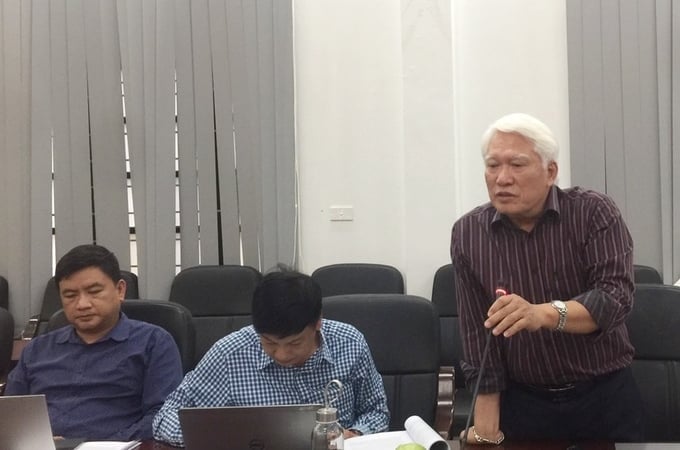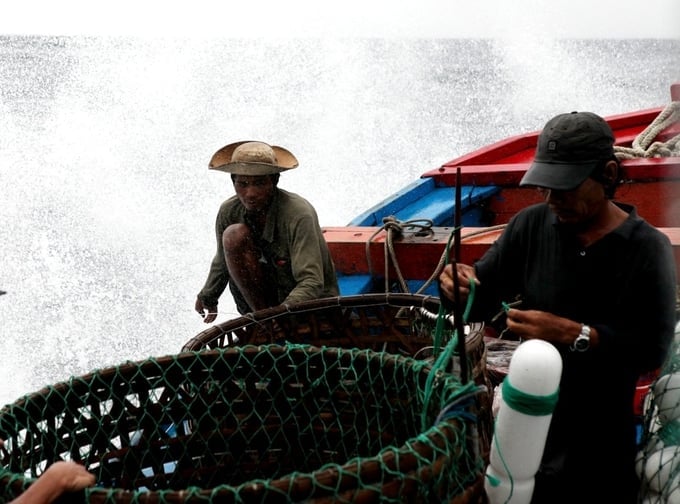May 21, 2025 | 08:06 GMT +7
May 21, 2025 | 08:06 GMT +7
Hotline: 0913.378.918
May 21, 2025 | 08:06 GMT +7
Hotline: 0913.378.918
The draft "Project on Fisheries, Fishermen, and Fishing Grounds by 2030, with a vision towards 2045" was prepared by the Vietnam Institute of Fisheries Economics and Planning under the Ministry of Agriculture and Rural Development. Accordingly, the project sets the overall goal to continue the industrialization and modernization of the fishing profession as well as develop a comprehensive, efficient, and sustainable fisheries sector. Consequently, the sector will stand as a well-structured and organized economic pillar in accordance with the available resources and environmental considerations. The project aims to achieve productivity, quality, effectiveness, and high competitiveness, thereby ensuring strong integration into the national economy.

Mr. Nguyen Chu Hoi, Permanent Vice Chairman of the Vietnam Fisheries Association, stated, "We need thorough discussions in order to develop a comprehensive fisheries project that will be approved by the Prime Minister and benefit the sector." Photo: Hong Tham.
The sustainable exploitation of marine resources and the aquatic environment, as well as the ecological balance in the marine areas, is reinforced through sensible and compatible practices with an emphasis on the capacity for renewal and preservation.
The continual enhancement of the living standards and spiritual well-being of coastal communities is promoted, in acknowledgement of the distinctive characteristics of fishing villages. The community is nurtured to attain an equivalent level of production capacity with other countries possessing a thriving fisheries sector in the region. Additionally, fishermen will be trained on international labor laws and political acumen with regards to maritime activities. Subsequently, the local communities will be enabled to spearhead maritime activities in Vietnam's coastal and island regions.
The draft plan also delineates specific objectives: By 2025, it aims to reduce the number of various fishing vessels by 2,000, increase the mariculture area to 280,000 hectares, and attain a mariculture yield of 850,000 tons. The percentage of fishermen transitioning to new careers for a sustainable livelihood, after undergoing training and skill development, is expected to reach at least 50%.
By 2030, the project aims to further reduce the number of fishing vessels by 4,000, expand the mariculture area to 300,000 hectares, and achieve a mariculture yield of 1.45 million tons. The growth rate of harvested and cultivated aquatic product value is expected to reach an average of 1.5% annually. The average income of the labor force engaged in fisheries and mariculture is projected to increase by 2.5 times compared to the that in 2020. The majority of local fishermen will transition to new professions, receive training in new skills, and lead a stable livelihood. Moreover, the average income of the rural coastal communities is expected to increase by 2.5 times compared to 2020.
By 2045, the project aims to establish a cultured and fully developed coastal population with high income levels. Marine resources will be strengthened, ensuring the sustainability of the fisheries sector. Aquaculture becomes a significant replacement for fishing as the sector transitions to become responsible and sustainable. This involves large-scale production of high-value goods, strong market linkages domestically and internationally, a modern seafood processing and preservation industry, and a firm position as a leading exporter of seafood globally. Rural areas will be modernized, offering a comfortable life close to urban areas with green, clean, and beautiful living environments which are rich in national cultural heritage. National defense, security, law, order, and social safety are also securely maintained.
To ensure the successful realization of this vision, the Vietnam Institute of Fisheries Economics and Planning recently organized a workshop to gather expert opinions within the fisheries sector for the development of the "Project on Fisheries, Fishermen, and Fishing Grounds by 2030, with a vision towards 2045."

The draft "Project on Fisheries, Fishermen, and Fishing Grounds by 2030, with a vision towards 2045" envisions a prosperous and highly developed coastal community, characterized by high income levels and a cultured population. Photo: Hong Tham.
Mr. Nguyen Thanh Binh, Deputy Director of the Vietnam Institute of Fisheries Economics and Planning, stated, "Climate change, natural disasters, diseases, and external challenges are posing threats to the achievements of the fisheries sector. Fishermen, fisheries, and fishing grounds are integral components to the sector and thus are impacted by these challenges."
"In addition, we are facing several difficulties and challenges during the transformation from small-scale, spontaneous fishing to responsible and sustainable fishing practices within our domestic fisheries sector. Fishermen, fisheries, and fishing grounds are key aspects that significantly influence this transformation and the development of sustainable fishing," Mr. Binh further emphasized.
He posited, "The development of the 'Project on Fisheries, Fishermen, and Fishing Grounds by 2030, with a vision towards 2045' aims to utilize the available strengths of the fishing community, the market mechanisms, and international cooperation to mobilize resources and empower the fishing community. Subsequently, they will be encouraged to actively participate in the sustainable development of fisheries in connection with economic restructuring and labor force changes in the fisheries sector."
According to Mr. Nguyen Chu Hoi, Deputy Chairman of the Vietnam Fisheries Association, "The idea of the triple-fishery concept, comprising fishermen, fisheries, and fishing grounds, has been discussed for many years, and it has undergone a lengthy policy advocacy process. Minister of Agriculture and Rural Development Le Minh Hoan is also concerned about this significant and long-standing issue. As a result, we need to develop a comprehensive triple-fishery project for the Prime Minister's approval. The triple-fishery project must be the intellectual product of the industry."
He further suggests, "Funds should be allocated for organizing numerous workshops and meetings with relevant stakeholders, as the triple-fishery concept involves various fields, including marine spatial planning or other marine and coastal-related planning. We need thorough discussions in order to develop a comprehensive fisheries project that will be approved by the Prime Minister and benefit the sector."
The draft "Project on Fisheries, Fishermen, and Fishing Grounds by 2030, with a vision towards 2045," outlines six development solutions for fishermen, fisheries, and fishing grounds: Innovating communication, unifying perception, and taking action in fisheries, fishermen, and fishing grounds; Completing the agricultural production structure in association with competitive advantages and market development; Training and developing human resources, creating on-site employment for fishermen, and enhancing their roles, positions, capabilities, and overall livelihoods; Improving the fisheries, fishermen, and fishing grounds framework and policies; Advancing scientific and technological expertise, promoting digital transformation and innovation to develop fisheries, fishermen, and fishing grounds efficiently and sustainably in the direction of blue economy and enhancing quality and added value; Strengthening international integration and cooperation.
Translated by Nguyen Hai Long

(VAN) Japan's grant aid project contributes to capacity building, promoting organic agricultural production, and fostering sustainable community development in Dong Thap province.

(VAN) For years, the CRISPR-Cas9 genome technology has been reshaping genetic engineering, a precision tool to transform everything from agriculture to medicine.

(VAN) Vietnam aims to become a 'leader' in the region in the capacity and managing effectively soil health and crop nutrition.
![Reducing emissions from rice fields: [Part 1] Farming clean rice together](https://t.ex-cdn.com/nongnghiepmoitruong.vn/608w/files/news/2025/05/05/z6509661417740_a647202949c539012a959e841c03e1d3-nongnghiep-143611.jpg)
(VAN) Growing clean rice helps reduce environmental pollution while increasing income, allowing farmers to feel secure in production and remain committed to their fields for the long term.
/2025/05/19/5136-1-144800_230.jpg)
(VAN) The Nghe An Provincial People's Committee has just approved the list of beneficiaries eligible for revenue from the Emission Reductions Payment Agreement (ERPA) in the North Central region for the year 2025.

(VAN) 14 out of 35 domesticated elephants in Dak Lak province have had their living conditions improved, with 11 of them currently participating in the non-riding elephant tourism model.

(VAN) Muong Nhe Nature Reserve hopes that being upgraded to a national park will lay the foundation for forest protection efforts to be carried out in a systematic, modern, and sustainable manner.